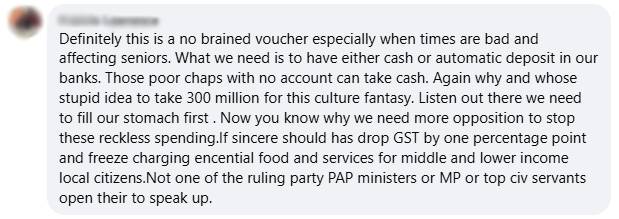SINGAPORE: Minister for Culture, Community, and Youth Edwin Tong announced at a ministerial town hall on 21 February that S$300 million will be allocated for the SG Culture Pass over the next three years.
The initiative, introduced by Prime Minister Lawrence Wong in the 2025 Budget, aims to make local arts and heritage more accessible to Singaporeans.
Starting in September 2025, all Singapore citizens aged 18 and above will receive S$100 in credits, valid until December 2028.
These credits can be used to offset ticket purchases for local arts and heritage offerings, including performances, exhibitions, immersive experiences, and participatory workshops.
Tong highlighted that the SG Culture Pass is a nationwide programme available to all eligible Singaporeans.
It is exclusively for local arts and heritage events, ensuring support for homegrown creators. The initiative also prioritises in-person experiences to foster community engagement.
To streamline accessibility, a dedicated website will be developed, consolidating eligible offerings and allowing Singaporeans to browse events, purchase tickets, and apply their Culture Pass credits.
The government is finalising details, with guidelines and eligibility criteria expected to be shared soon. The application process for programme participation is set to open in March.
Tong encouraged local practitioners to put forward compelling offerings to attract new audiences, noting that the three-year duration provides ample time for planning and execution.
He urged creators to think innovatively and collaborate across disciplines to maximise the Culture Pass’s impact.
Expansion of Arts Education and Scholarships
Beyond the Culture Pass, the government is expanding arts education and scholarship opportunities.
The National Arts Council (NAC) will introduce the Arts Education Programme to all Early Childhood Development Agency (ECDA)-supported preschools and implement Performing Arts-Based Learning for all lower secondary students in Ministry of Education (MOE) schools by 2027.
Tong emphasised the importance of introducing children to the arts from a young age to cultivate lasting appreciation.
The initiative aims to ensure that every preschool and lower secondary student experiences arts education, fostering future engagement with Singapore’s cultural scene.
Additionally, the Ministry of Culture, Community, and Youth (MCCY) and NAC will enhance arts scholarships.
The NAC Arts Scholarship for degree studies will receive increased funding, while a new NAC Creative Arts Scholarship will be introduced for pre-tertiary and diploma students.
These scholarships aim to support aspiring artists in pursuing full-time careers in the arts, with further details to be announced later this year.
Public Concerns Over Financial Priorities
Despite the government’s push for arts engagement, many netizens expressed scepticism about the SG Culture Pass, questioning its relevance amid financial struggles.
One user highlighted that Singaporeans are facing unemployment, retrenchments, rising costs of living, and increasing commercial and residential rental fees.
They questioned whether this was the best the government could come up with, expressing disbelief at the initiative.

Another user argued that Singaporeans need food to survive rather than cultural or concert vouchers, pointing to recent cases of food theft as an indication of financial distress.
They also criticised the government, stating that only in Singapore could “jokers” become ministers.

A different user questioned the need to promote culture when many are struggling to make a living, dismissing the initiative as a superficial attempt by the government to appear generous while failing to address real economic concerns.

One user expressed frustration, questioning how the government could expect people to attend cultural events during such difficult times.
They speculated that the Culture Pass was designed for those who see themselves as superior to others and do not require alternative means to access cultural activities.
They also disagreed with the decision to allocate S$300 million for this purpose.

Calls for Direct Financial Aid Instead
One netizen criticised the programme, arguing that it failed to address immediate financial concerns.
The user suggested that direct financial aid, such as cash payouts or automatic bank deposits, would have been a more practical approach.
The Culture Pass was described as a misplaced priority, particularly during an economic downturn when seniors and low-income groups are struggling.
The decision to allocate S$300 million to this initiative was also questioned, with the user suggesting that reducing the Goods and Services Tax (GST) or freezing charges on essential goods and services would have provided more meaningful relief to middle- and lower-income citizens.

Doubts Over Who Truly Benefits
There were also doubts about whether the SG Culture Pass would genuinely benefit local culture.
Some speculated that the initiative was politically motivated, possibly aimed at gaining support ahead of upcoming elections.

Others questioned whether the programme would truly help Singaporeans or simply serve as a way for the government to recover what it had spent.
One user expressed disappointment with the budget, arguing that it did little to ease the financial burdens faced by locals.

As concerns over financial struggles persist, many remain unconvinced that the SG Culture Pass is the best way to support Singaporeans in these challenging times.
The backlash against the SG Culture Pass highlights a fundamental disconnect between government priorities and the public’s immediate concerns.
While cultural engagement is valuable, history shows that societies invest in the arts when their basic needs are secured.
For many Singaporeans struggling with rising costs, job uncertainty, and financial stress, an initiative focused on cultural spending appears out of touch.
The reaction reflects broader frustrations about the government’s allocation of resources—many believe that direct financial aid or cost-of-living relief would be more impactful than subsidized cultural experiences at a time when economic hardship is a pressing issue.
The post S$300M SG Culture Pass sparks public backlash as netizens call it a misplaced priority appeared first on The Online Citizen.


